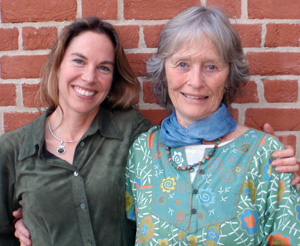
Camilla Fox with dear friend and tireless conservationist Virginia McKenna of the Born Free Foundation
Blogging from Oxford, England from the Compassionate Conservation Conference - a ground-breaking International Symposium on animal welfare in conservation practice. The Symposium, sponsored by the Wildlife Conservation Research Unit (WildCRU) and the Born Free Foundation, has brought together scientists and practitioners from a range of disciplines to debate animal welfare issues in conservation, look for practical outcomes and promote a dialogue between the two disciplines that are often perceived as mutually exclusive.
The Symposium is organized around the following themes:
•Animal welfare in field conservation
•Captive animal welfare and conservation
•Conservation consequences of wildlife rescue, rehabilitation and release
•International trade in live wild animals
Here with me is my colleague, good friend, and Project Coyote Advisory Board member, Dr. Marc Bekoff who addressed some challenging ethical questions around reintroduction and conservation projects in his keynote address including:
•Should we kill for conservation?
•What trade-offs must be made between ethics and conservation goals?
•Can conservation biologists do good science - save individuals, species, and ecosystems - and also be compassionate?
•What role does sentience play in our decisions?
Representing both Project Coyote and the Animal Welfare Institute, I spoke about predator management in the United States and why we need to move away from indiscriminate killing methods like poisons, snaring, aerial gunning, body-count bounties and contest hunts and recognize the important role that native carnivores play in healthy ecosystems.
I also discussed an alternative model that was adopted in my home county in Marin Co, California -known as the Marin County Livestock and Wildlife Protection Program- after controversy erupted when local citizens learned that Marin was going to be one of three northern California counties to test the deadly poison Compound 1080 on coyotes by the federal government (see my previous blog about this poison and the current federal bill that would ban it). The local Marin initiative - unique in its kind- assists ranchers with implementing non-lethal animal husbandry techniques instead of killing native carnivores with federal trappers through the U.S. Department of Agriculture's "Wildlife Services" program.
It is refreshing to see these challenging issues of how we balance conservation with the needs and lives of individual animals debated in an international forum with some of the brightest thinkers and visionaries of our time. It is my hope that out of this symposium there will be more collaboration between conservationists and animal welfare advocates where common ground and goals can be identified.
For more information about this conference and related issues:
Compassionate Conservation Finally Comes of Age: Killing in the name of conservation doesn't work: Ethics must be firmly implanted in conservation biology
By Marc Bekoff, Psychology Today
First do no harm ~ In putting conservation into practice, we often cause great suffering to animals. Marc Bekoff argues that we need a new ethical perspective
By Marc Bekoff, New Scientist
Animal-welfare needs to go wild say Raincoast scientists
Raincoast Conservation Foundation
Follow Project Coyote on Facebook